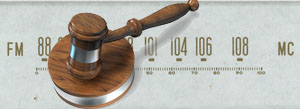While we commonly accept that broadcast stations and, especially, their licenses to broadcast have a market value, for most of US broadcasting history there was no direct cost to obtain that license. Sure, there were engineer surveys to conduct, lawyers to pay, and so on. But the license itself came at no cost from the FCC. That license was supposed to be in exchange for operating in the “public interest, convenience and necessity.” Given that this obligation was rendered mostly unenforceable, if not laughable, by 1996, Congress figured it was better to try to cash in.
So, for all intents and purposes the Telecommunications Act of 1996 pretty much changed the whole free license thing for commercial stations, instituting an auction process for new commercial radio licenses whenever there are competing applicants. Since there it’s a rare occasion when there’s only one applicant for a commerical frequency, in practice most new licenses are auctioned off. There hasn’t been much hubub about this change in part because there have been relatively few new broadcast radio licenses available in the last fourteen years; most major metropolitan radio dials pretty well filled up by the 1990s.
Nevertheless, there are a few spots on the dial left, scattered about the country. In fact the FCC will be auctioning a total of 15 radio licenses this coming July–thirteen commercial FM, one commercial FM translator and one commercial AM [public notice PDF]. Before you start counting your pennies and cashing in savings bonds, understand that if you haven’t already submitted an application to the FCC, then you’re out of luck. The participants in the auction are already determined because they’ve submitted applications for frequencies for which there are other competing applications.
The number of bidders for a single frequency range from just two to as many as seven (that’s for a spot on the dial in Idalou, TX, just outside of Lubbock). The FCC sets a minimum opening bid, which each bidder must also submit as an upfront payment. This opening bid is based upon the prices obtained in earlier auctions from the same market. To bid on a license in the Hudson Valley town of Rosendale, NY you’d have to pony up $100,000 to start, whereas in New Holstein WI, about 25 miles northwest of Sheboygan, the starting bid is just $15,000. A hundred grand may not sound like chump change for a station license, but compared to the market value it’s a bargain. An existing station in New York’s Hudson Valley is likely to be at least five times that, if not more.
We’ll be watching to see what the selling prices end up being when the final gavel falls. Stay tuned.



